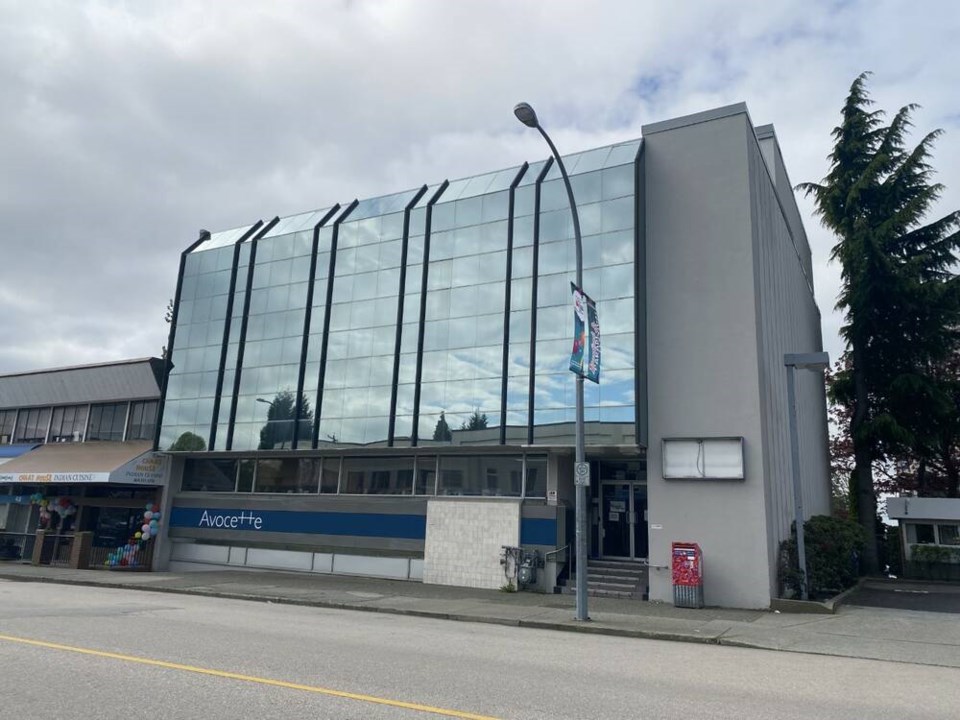The Lower Mainland Purpose Society is hoping to create up to 30 beds in uptown New West for people who are or are at risk of or are experiencing homelessness – but it needs to get it approve fast in order to qualify for federal funding.
On Monday, city council received a preliminary application for a proposal for 422 Sixth St., where the Purpose Society is proposing to convert the top two floors of the existing four-storey commercial building to supportive housing. The project would include 24/7 staff support and catering services.
A staff report states the proposed layout of the uppers two storeys consists of about 15 individuals per floor, with shared bathroom, kitchenette and common areas. The ground floor and the basement would be used for office, program and catering uses.
The existing zoning permits housing units above the ground floor, but because of the shared facilities and support services, the use is considered “supportive housing” – something that’s not permitted under the current zoning, said the report.
On Monday, council directed staff to work with the applicant to prepare a rezoning bylaw for the subject property that would be suitable for consideration of first, second and third readings.
According to the staff report, the Purpose Society would receive a $5,350,000 federal investment for the housing project – provided a rezoning is in place by July 1, 2023. Given that timeline, city staff are recommending an expedited rezoning timeline.
Now that council has received the preliminary report about the project, the next steps in the application review process include city-led public consultation, followed by council’s consideration of the rezoning application, issuance of notice that no public hearing would be held, followed by consideration of the zoning amendment bylaw.
According to staff, a housing needs report indicates there will be a need for 358 new supportive housing beds between 2021 and 2031.
Council unanimously supported a recommendation to direct staff to work with the applicant to prepare a rezoning bylaw and to proceed with processing the proposed rezoning of the property.
Coun. Daniel Fontaine said he supports the provision of additional supportive housing, but wants to make sure it’s built in the right location. He questioned if the city could be “opening up a door” to allowing more conversions of office or commercial space into housing.
“I think the important thing to point out here is that housing units are actually already permitted on the second and third floors of this building,” said Demian Rueter, acting senior manager of climate action, planning and development. “The change of use that the zoning would permit was only to allow that the specific transitional housing, supportive housing.”
Rueter said there are examples throughout the region of office buildings being converted to residential. In this case, Rueter said the bottom two floors of the four-storey building will continue to be used for uses that support an active street front.
The next step would be to open up that Be Heard page and the city- led consultation. We have already prepared that in advance,” Rueter said. “We would be bringing the results back of what we heard in the city consultation at our next meeting for council’s consideration prior to readings of the bylaw, if appropriate.”
Fontaine said he’d like to see priority for the new supportive housing beds go to people in New Westminster. He said New West is “punching above its weight” but some neighbouring cities aren’t providing enough supportive housing in their communities.
“Generally, our operators of supportive and affordable housing do try to prioritize residents of New Westminster, but we recognize that there is also fluidity around the region of people who do need affordable and supportive housing,” said Jackie Teed, the city’s acting director of climate action, planning and development. “Certainly, the main practice is to keep people in their communities and their neighbourhoods because we know that’s the best way to support.”




